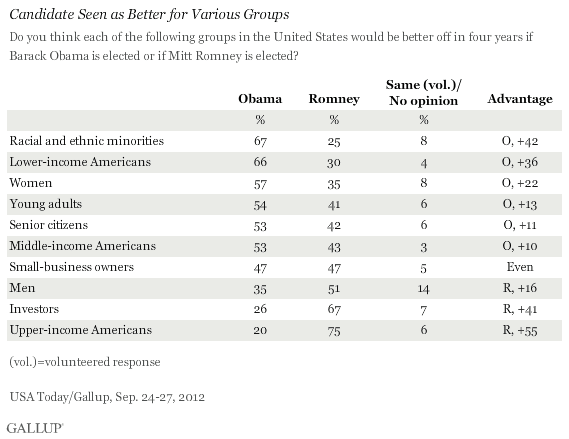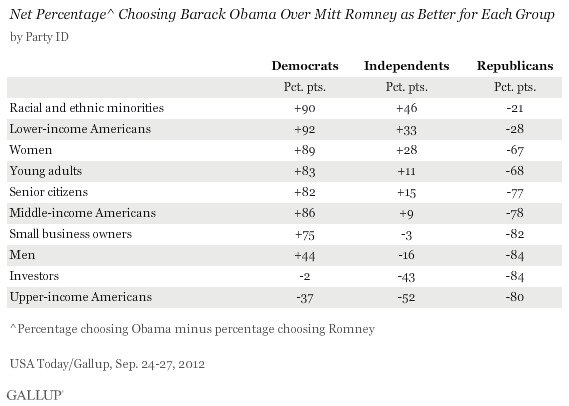PRINCETON, NJ -- More Americans believe middle-income earners would be better off in four years if President Barack Obama is re-elected than if Mitt Romney wins, by 53% to 43%. The public also says lower-income Americans would be better off under an Obama presidency, while, by an even larger margin, they say upper-income Americans would do better under Romney.

Other groups that Americans believe stand to do well under Obama are racial and ethnic minorities, women, young adults, and senior citizens. Anywhere from 53% to 67% of Americans name Obama as better for these groups, compared with fewer than half picking Romney.
In addition to upper-income Americans, respondents to the Sept. 24-27 USA Today/Gallup poll believe that investors and men would fare better under a Romney presidency. Americans are evenly divided as to which of the two candidates would be better for small-business owners.
Responses Show Predictable Partisan Patterns
As would be expected, these views are highly partisan -- with the vast majority of Republicans and Democrats naming their own party's candidate as better for most groups. The only exceptions are that two-thirds of Democrats believe upper-income Americans would be better off under Romney -- indicating that they don't consider this a positive credential. Also, Democrats are evenly divided between naming Obama (46%) and Romney (48%) as better for investors.
Independents' views, important given their role as swing voters in what could be a close election, closely match those of the public at large.

Bottom Line
Americans overwhelmingly believe a continuation of the Obama presidency would be more helpful to racial and ethnic minorities, lower-income Americans, and women than would a Romney presidency. On the other hand, they perceive that upper-income Americans and investors would be better off if Romney wins. These images of the two candidates generally fit the traditional profile of the Democratic and Republican parties. Also, the view that a Romney presidency would disproportionately favor the rich and investors has been a persistent theme in the Obama campaign's focus on Romney, underscoring concerns highlighted earlier by the Occupy Wall Street movement.
Still, it is not clear whether these strong special-interest-oriented associations are more helpful or harmful to either candidate. For example, some may consider Romney's potential aid to investors as undesirable, while others could see it as a positive -- believing that what is good for investors is in turn good for the overall economy. Similarly, the view that Obama would help lower-income Americans is likely considered positive by many, but could be interpreted as more negative by those who are leery of increased government involvement in redistribution of income.
Small business ranks as one of the most well-respected institutions in the U.S. according to recent Gallup polling, and thus it's notable that Obama and Romney are tied in perceptions of whose presidency would most benefit small-business owners.
Perhaps the most important of these groups for the candidates is "middle-income" Americans, as this represents the broad core of the electorate and, among income groups, is least strongly supportive of one candidate or the other. The fact that Obama has a 10-percentage-point edge over Romney in perceptions of the candidate who would be better for this group may help explain his current advantage in registered voters' preferences for president in Gallup Daily tracking.
Survey Methods
Results for this USA Today/Gallup poll are based on telephone interviews conducted Sept. 24-27, 2012, with a random sample of 1,446 adults, aged 18 and older, living in all 50 U.S. states and the District of Columbia.
For results based on the total sample of national adults, one can say with 95% confidence that the maximum margin of sampling error is ±3 percentage points.
Interviews are conducted with respondents on landline telephones and cellular phones, with interviews conducted in Spanish for respondents who are primarily Spanish-speaking. Each sample includes a minimum quota of 400 cell phone respondents and 600 landline respondents per 1,000 national adults, with additional minimum quotas among landline respondents by region. Landline telephone numbers are chosen at random among listed telephone numbers. Cell phone numbers are selected using random-digit-dial methods. Landline respondents are chosen at random within each household on the basis of which member had the most recent birthday.
Samples are weighted by gender, age, race, Hispanic ethnicity, education, region, adults in the household, and phone status (cell phone only/landline only/both, cell phone mostly, and having an unlisted landline number). Demographic weighting targets are based on the March 2011 Current Population Survey figures for the aged 18 and older non-institutionalized population living in U.S. telephone households. All reported margins of sampling error include the computed design effects for weighting and sample design.
In addition to sampling error, question wording and practical difficulties in conducting surveys can introduce error or bias into the findings of public opinion polls.
View methodology, full question results, and trend data.
For more details on Gallup's polling methodology, visit www.gallup.com.
